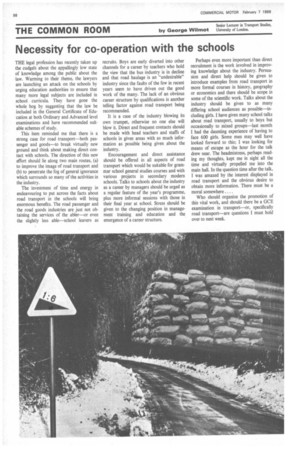Necessity for co-operation with the schools
Page 100

If you've noticed an error in this article please click here to report it so we can fix it.
THE legal profession has recently taken up the cudgels about the appallingly low state of knowledge among the public about the law. Warming to their theme, the lawyers are launching an attack on the schools by urging education authorities to ensure that many more legal subjects are included in school curricula. They have gone the whole hog by suggesting that the law be included in the General Certificate of Education at both Ordinary and Advanced level examinations and have recommended suitable schemes of study.
This item reminded me that there is a strong case for road transport—both passenger and goods—to break virtually new ground and think about making direct contact with schools. The direction of this new effort should lie along two main routes, (a) to improve the image of road transport and (b) to penetrate the fog of general ignorance which surrounds so many of the activities in the industry.
The investment of time and energy in endeavouring to put across the facts about road transport in the schools will bring enormous benefits. The road passenger and the road goods industries are just not obtaining the services of the abler—or even the slightly less able—school leavers as recruits. Boys are early diverted into other channels for a career by teachers who hold the view that the bus industry is in decline and that road haulage is an "undesirable" industry since the faults of the few in recent years seem to have driven out the good work of the many. The lack of an obvious career structure by qualifications is another telling factor against road transport being recommended.
It is a case of the industry blowing its own trumpet, otherwise no one else will blow it. Direct and frequent contacts should be made with head teachers and staffs of schools in given areas with as much information as possible being given about the industry.
Encouragement and direct assistance should be offered in all aspects of road transport which would be suitable for grammar school general studies courses and with various projects in secondary modern schools. Talks to schools about the industry as a career by managers should be urged as a regular feature of the year's programme, plus more informal sessions with those in their final year at school. Stress should be given to the changing position in management training and education and the emergence of a career structure. Perhaps even more important than direct recruitment is the work involved in improving knowledge about the industry. Persuasion and direct help should be given to introduce examples from road transport in more formal courses in history, geography or economics and there should be scope in some of the scientific work. Talks about the industry should be given to as many differing school audiences as possible—including girls. I have given many school talks about road transport, usually to boys but occasionally to mixed groups—last month I had the daunting experience of having to face 600 girls. Some men may well have looked forward to this; I was looking for means of escape as the hour for the talk drew near. The headmistress, perhaps reading my thoughts, kept me in sight all the time and virtually propelled me into the main hall. In the question time after the talk, I was amazed by the interest displayed in road transport and the obvious desire to obtain more information. There must be a moral somewhere ....
Who should organize the promotion of this vital work, and should there be a GCE examination in transport—or, specifically road transport—are questions I must hold Over to next week.












































































































































































